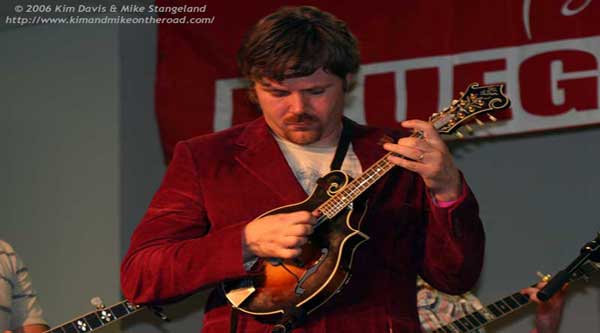What Goes Up Might Come Down. Or It Might Not.
By David McGee
GRAVITY’S OUR ENEMY
Cadillac Sky
Skaggs Family RecordsWhere to begin enumerating the many virtues of Cadillac Sky’s thrilling Gravity’s Our Enemy? This is some kind of aggressive progressive bluegrass the quintet is offering, as if they’re trying to one-up the Punch Brothers. There isn’t anything on this long player as ambitious as Chris Thile’s four-movement “The Blind Leaving the Blind” on Punch!, but there’s not a single track that doesn’t arrest one’s attention with its unpredictable textures and dynamics, and the exhilirating variety of influences the musicians have melded into a signature sound to support the advanced songwriting artistry of Bryan Simpson.
Fleeting touches tickle the intellect—the circa-Sympathy For the Devil Stones-like “woo-hoos” in “Goodbye Story” and, in the same song, the tinge of Sun studio reverb adding depth to Simpson’s voice; the plaintive Beatles-esque harmonies rising up in the soaring choruses of the inventive hot swing-based workout titled “Inside Joke” and, near the end of the same song, a background sound of mocking laughter that is a pure late period Beatles touch, albeit purposely more malevolent than the fellow having such a hearty chuckle as “Ob-La-Di, Ob-La Da” winds down. And though Simpson’s steely tenor voice and his emotive phrasing can sound uncannily like Chris Thile’s, its timbre, especially when the guys blend their voices in ascending, close-harmonized choruses, is strikingly similar to the Allan Clarke-led Hollies of the mid-‘60s. Time after time Cadillac Sky comes off like a backwoods version of the Hollies, and one can’t help but notice the inclusion of a song titled “Carousel,” and recall one of the Hollies’ great singles being “On a Carousel.” The Beatles’ influence on country’s New Traditionalist movement is well documented, but Cadillac Sky’s touchstones are much more “Carrie Anne” than “Baby’s In Black.”
Bryan Simpson: no cynics, no love beads eitherBut where Cadillac Sky is coming from is the least part of the story. Bryan Simpson is a gifted songwriter with a heart and a conscience informing his work. The straight-ahead country rumble of “Everybodys Favorite” frames the story of a young girl groomed from stardom from childhood. Ultimately finding her star’s life vacuous and unfulfilling, she fakes her own death and flees to parts unknown, sans makeup and bling, wearing “the same blue jeans she wore yesterday,” looking forward to a bright future in obscurity. “Bible By the Bed” chronicles the horrors inflicted on a spouse by an abusive husband, a man “she ain’t seen … since the day they said ‘I do,” leading her to conceal a gun under her pillow, right next to the nightstand where her Bible rests. Of course she ends up using the gun, but Simpson renders no judgments of either party, but instead withdraws from the action as the woman kneels beside her dying husband, as with his dying breath he asks, “My dear child, what wrong have you done?” The antiquity of the language is startling, the most effective and memorable grace note Simpson could have penned to end the drama to make sure it lingers in memory. The aforementioned “Goodbye Story,” all herky jerky rhythms and a real star turn for busy fiddler Ross Holmes, takes a totally unsympathetic tack towards a gal who’s bereft over lost love, essentially kissing off her misfortune (while reminding her of the fellow “whose wife ran off with a rodeo clown,” a lyric you have to love) by pointing out the commonality of her experience, boiling it down to a sarcastically rendered, “this world’s gonna keep on turning/everybody’s got a goodbye story to tell.” Ouch. In a similar vein, in the hard charging, fiddle- and mandolin-driven “It Won’t Be Over You,” Simpson describes the many states of heartbreak he’ll endure after he’s dumped—a kind of false bravado, one suspects, based on the earnestness of his assertions—“but it won’t be over you.” But with all the turmoil chronicled on Gravity’s Our Enemy, Simpson finds, perhaps, a reason to believe at the album’s close, in the surging instrumental attack and keening harmonies of “2 Good To Last.” The song is less a reflection on a failed romance than a call to live in the moment, because the moment—life—is so fleeting, “too good to last.” Behind Simpson, Matt Menefee fashions ever-cascading rushes of banjo lines and Holmes’s fiddle swoops and cries and moans in a glorious crescendo of life-affirming energy—the catch being that Simpson’s voice has just enough ache in it to knock you off balance in the midst of a reverie. Does he believe it’s too good to last, or too good to lose? One suspects Simpson isn’t petitioning for cynics, but he’s not handing out any love beads either. There’s more work to do on all fronts before he issues any definitive statements.
THE BLUEGRASS SPECIAL
Founder/Publisher/Editor: David McGee
Contributing Editors: Billy Altman, Derk Richardson
Logo Design: John Mendelsohn (www.johnmendelsohn.com)
Website Design: Kieran McGee (www.kieranmcgee.com)
Staff Photographers: Audrey Harrod (Louisville, KY; www.flickr.com/audreyharrod), Alicia Zappier (New York)
E-mail: thebluegrassspecial@gmail.com
Mailing Address: David McGee, 201 W. 85 St.—5B, New York, NY 10024
Founder/Publisher/Editor: David McGee
Contributing Editors: Billy Altman, Derk Richardson
Logo Design: John Mendelsohn (www.johnmendelsohn.com)
Website Design: Kieran McGee (www.kieranmcgee.com)
Staff Photographers: Audrey Harrod (Louisville, KY; www.flickr.com/audreyharrod), Alicia Zappier (New York)
E-mail: thebluegrassspecial@gmail.com
Mailing Address: David McGee, 201 W. 85 St.—5B, New York, NY 10024



